中考英语二轮语法复习专题:情态动词课件(共49张PPT)
文档属性
| 名称 | 中考英语二轮语法复习专题:情态动词课件(共49张PPT) |  | |
| 格式 | pptx | ||
| 文件大小 | 737.3KB | ||
| 资源类型 | 试卷 | ||
| 版本资源 | 通用版 | ||
| 科目 | 英语 | ||
| 更新时间 | 2021-11-09 22:44:11 | ||
图片预览


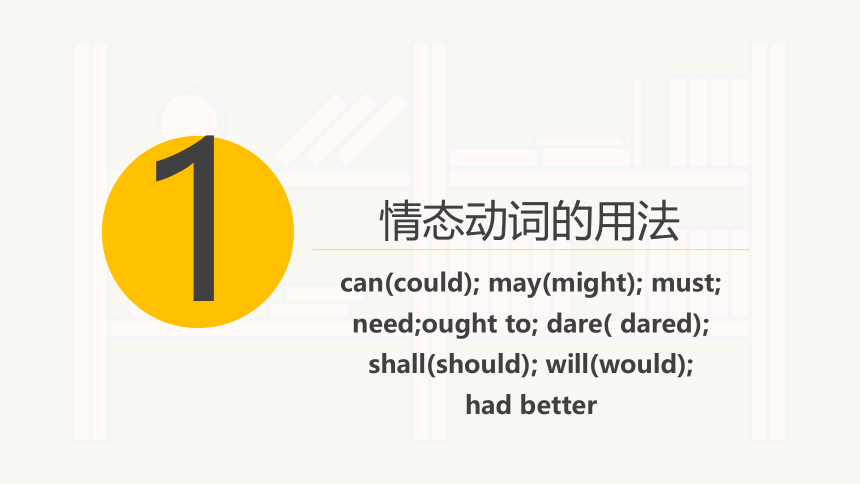
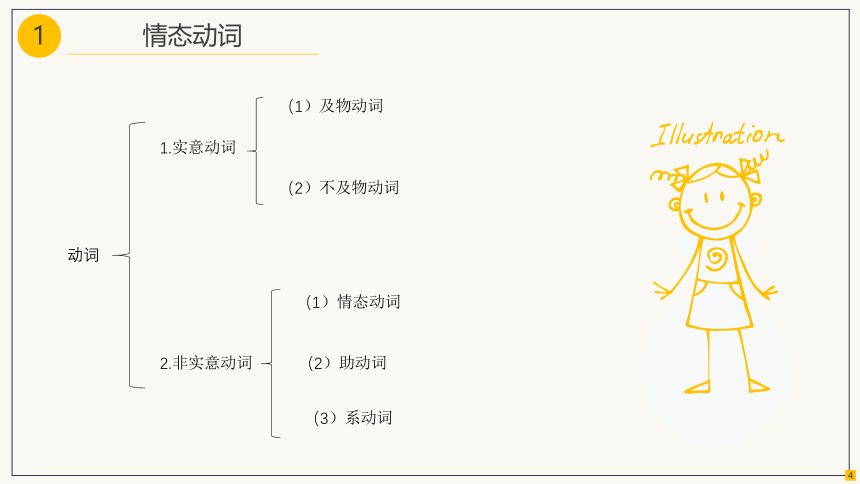
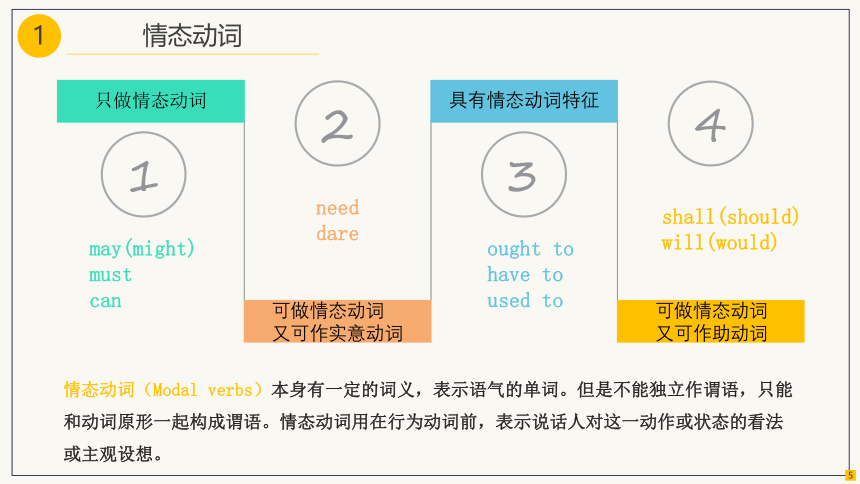
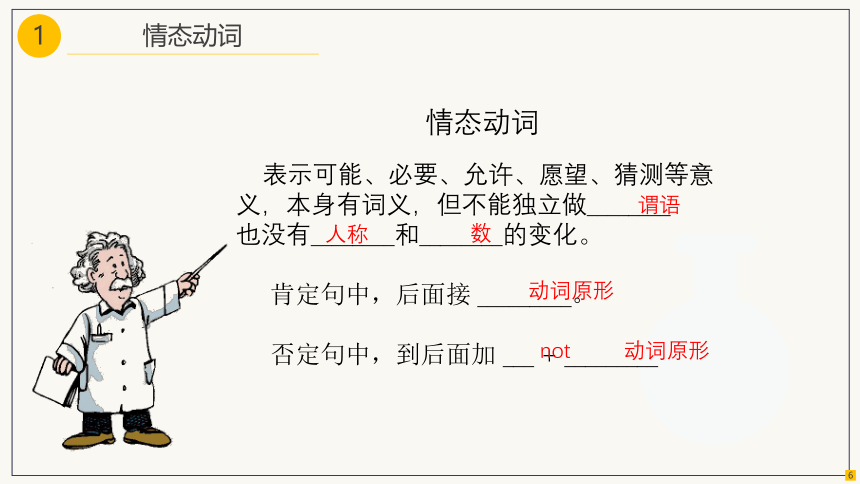
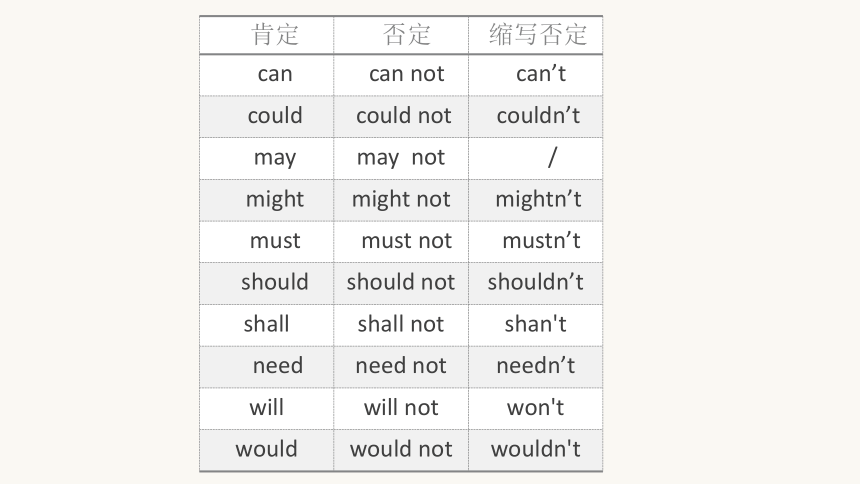

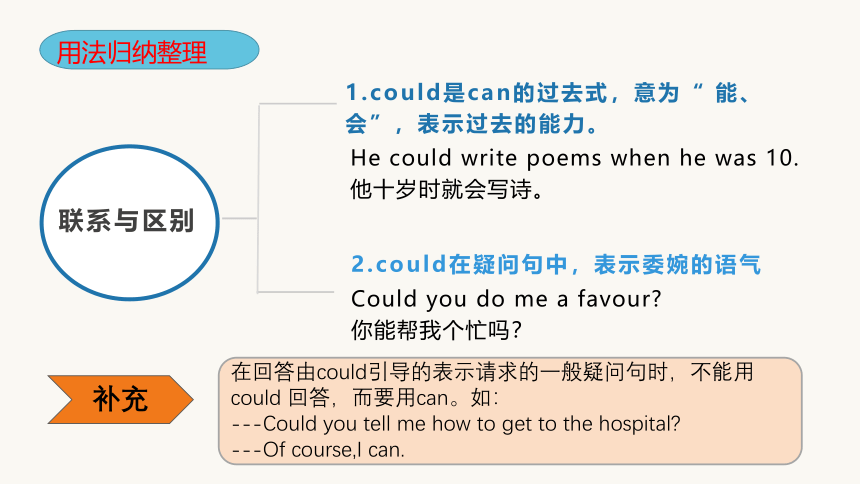
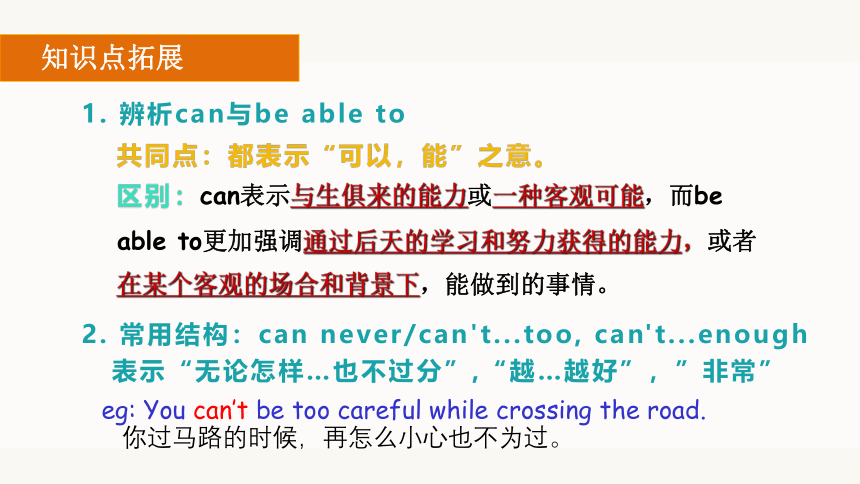
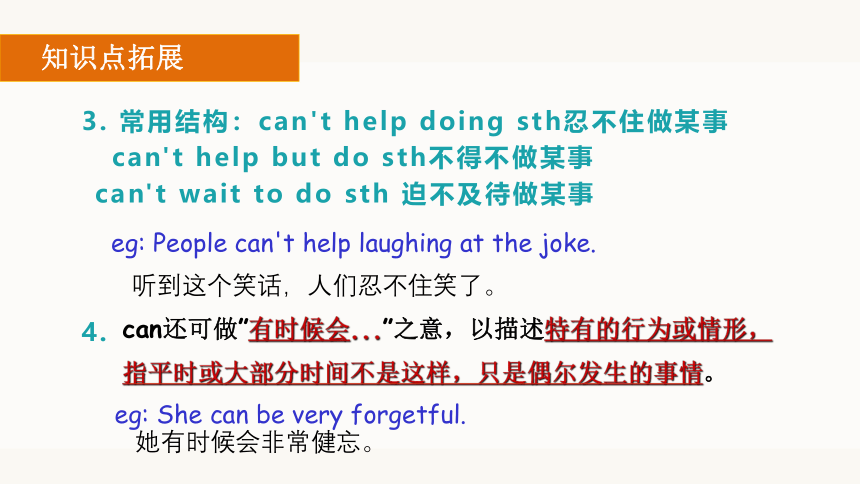
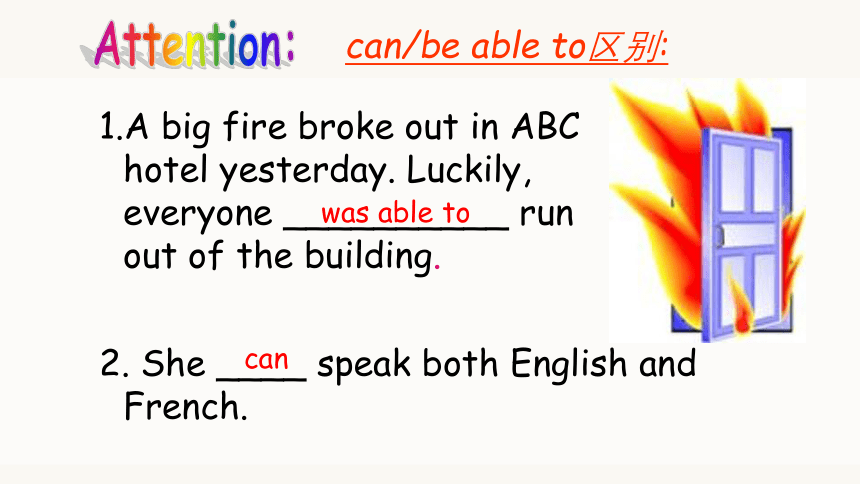
文档简介
(共49张PPT)
情态动词(Modal Verbs)
CONTENTS
目录
情态动词的用法
巩固练习
情态动词表推测对比
情态动词+have done
1
2
3
4
情态动词的用法
1
can(could); may(might); must;
need;ought to; dare( dared);
shall(should); will(would);
had better
肯定 否定 缩写否定
can can not can’t
could could not couldn’t
may may not /
might might not mightn’t
must must not mustn’t
should should not shouldn’t
shall shall not shan't
need need not needn’t
will will not won't
would would not wouldn't
用法归纳整理
can
could
I can speak English. 我会说英语。
1.表示能力、许可、可能性
It can't be our teacher. He is on a visit to the Great Wall.那不可能是我们的老师,他正在游览长城呢。
3.表示推测,意为“可能”,常用于否定句和疑问句中,此时can't 译为“不可能”。
Can it be true 那会是真的吗?
2.表示惊异、怀疑等
Can I come in 我能进来吗?
What can Mike mean 迈克可能是什么意思?
可以,能,会
用法归纳整理
联系与区别
He could write poems when he was 10.
他十岁时就会写诗。
1.could是can的过去式,意为“ 能、会”,表示过去的能力。
Could you do me a favour
你能帮我个忙吗?
2.could在疑问句中,表示委婉的语气
补充
在回答由could引导的表示请求的一般疑问句时,不能用could 回答,而要用can。如:
---Could you tell me how to get to the hospital
---Of course,I can.
知识点拓展
1. 辨析can与be able to
区别:can表示与生俱来的能力或一种客观可能,而be able to更加强调通过后天的学习和努力获得的能力,或者在某个客观的场合和背景下,能做到的事情。
共同点:都表示“可以,能”之意。
2. 常用结构:can never/can't...too, can't...enough
表示“无论怎样…也不过分”,“越…越好”,”非常”
eg: You can’t be too careful while crossing the road.
你过马路的时候,再怎么小心也不为过。
知识点拓展
4.
can还可做”有时候会...”之意,以描述特有的行为或情形,指平时或大部分时间不是这样,只是偶尔发生的事情。
3. 常用结构:can't help doing sth忍不住做某事
can't help but do sth不得不做某事
can't wait to do sth 迫不及待做某事
eg: People can't help laughing at the joke.
听到这个笑话,人们忍不住笑了。
eg: She can be very forgetful.
她有时候会非常健忘。
Attention:
can/be able to区别:
A big fire broke out in ABC hotel yesterday. Luckily, everyone __________ run out of the building.
was able to
2. She ____ speak both English and French.
can
典例剖析
1. ---Who is the man over there Is it Mr. Li
---No, it _______ be him. Mr. Li is much taller.
A. mustn't B. may not C. can't D. needn't
【思路点拨】can't表推测时,意为”不可能“。
2. ---Could I look at your pictures
---Yes, of course you ______.
A. could B. can C. will D. might
【思路点拨】could提问,表请求时,要用can回答。
用法归纳整理
may
might
May I borrow your bike
我可以借你的自行车吗?
1.表示请求、许可,比can正式。用于请求时,might比may更客气,委婉。
May you have a good time. 祝你过得愉快。
4.表示希望、祈求、祝愿,常可译为“祝愿”。通常是用may +主+V
He is away from school. He might be sick.
3.may的过去式为might,表示推测时。可能性低于may。
It may rain tomorrow. 明天可能会下雨。
2.表示推测,谈论可能性,意为“可能,或许”,一般用于肯定句中。
可以,可能
用法归纳整理
may be may be的may为情态动词,be为动词原形,在句中作谓语
maybe maybe是副词,意思为大概、也许,相当于perhaps,用在句首,作状语。
易混点一:may be 和maybe
典例剖析
1. ---May I go to the cinema, dad
---No, you ________. You must finish your homework
first.
A. mustn't B. don't C. may not D. needn't
【思路点拨】题中的may表示征询对方许可,表示“可以”的
意思,常与第一人称I连用,构成“May I... ”句式,表示
“我可以...吗?”肯定回答用Yes, you may.或Yes,please.
否定回答用“No, you mustn't/you can't.”不用No, you
may not.其意为“可能不”。
用法归纳整理
must
You must stay here until I come back.
在我回来之前你必须呆在这儿
must表示主观看法,意为“必须、一定”。这种“必须”多是出于义务、责任或强制命令。
You mustn't play with fire.你不许玩火。
其否定形式mustn't表示禁止
表示坚持,意为“非得...,偏要...”。
常用固定句型:if you must do sth.
如果你非得要做某事
must
The light is on,so he must be at home now.灯亮着,他现在肯定在家。
must表示有把握的推测,用于肯定句。意为“一定,肯定”
用法归纳整理
You mustn't miss the play. It is very good.
你不要错过那个剧,它非常好。
表示建议。
用法归纳整理
must must 侧重于个人意志和主观上的必要 must只用于一般现在或将来 I know I must study hard.
我知道我必须努力学习。
have to have to 侧重于客观上的必要,可用于现在时、过去时和将来时。 have to可以用于多种时态 My brother was very ill, so I had to call the doctor in the mid-night.我弟弟病得厉害,我只得半夜里把医生请来。
易混点二:must 和 have to
用法归纳整理
易混点三:can't 和 mustn't
'can't (1)不会,表示没有能力。如:I can't speak English . 我不会说英语。
(2)不能。如:We can't do it now because it's too dark.
天太黑了,我们现在干不了。
(3)否定句中表示推测,“不可能”。如:The man can't be our teacher because he is much younger than our teacher. 那个人不可能是咱们老师,他年轻得多。
mustn't 表示“不能”时,意为“ 禁止、不许”, 用来表达命令,表示强烈的语气。
You mustn't play football in the street. It's too dangerous.
你不能在街上踢足球,太危险了。
典例剖析
1. ---Must I finish the work before five o'clock
---No, you ___________.
A. needn't B. mustn't C. have to
【思路点拨】在回答由must开头的疑问句时,如果是
肯定回答,要用“Yes, you must”;如果是否定回答,
要用“No, you needn't/don't have to.”表示不必,
没有必要的意思,不用“mustn't”,因为mustn't表示
“禁止,不允许”的意思。
典例剖析
2. We should keep quiet in the library. We ____speak loudly.
A. can't B. mustn't C. may not D. needn't
【思路点拨】句意:我们在图书馆应该保持安静。我们不能
大声讲话。can't表示“不能”时,指没有能力;mustn't
表示“不能”时,指不允许,禁止;may not“可能不”,
needn't“不必要”,C、D两项均不合题意。
3.—Whose volleyball is this
—It ___________ be Linda's. She loves volleyball.
A.must B. can't C. needn't
【思路点拨】句意:——这是谁的排球?——它一定是琳达的。她喜欢排球。A. must一定是,表示猜测;B. can't不可能是;C. needn't不必。根据后一句she loves volleyball她喜欢排球,可知猜测一定是琳达的,故选A。
典例剖析
用法归纳整理
should
We should/ought to keep the air fresh.
我们应该保持空气清新。
表示劝告,建议,要求,命令,意为“应该”。
否定形式shouldn't为”不应该“。其同义词组为ought to“应该”,在疑问句中,通常用should而不是ought to。
The concert should be great fun.
音乐会一定会很有意思。
表示预期,意为”想必会,应该会,一定会“
When should we have a meeting
我们应该什么时候开会?
用法归纳整理
should
表示意外,惊讶,纳闷等,意为“居然,竟然”。
I can’t believe such a gentleman should be so
rude to the old.
我不敢相信这样一个绅士居然对老人如此无礼。
表示猜测时,一般指按经验或逻辑判断,意为“照说应该,估计,想必”
He should be home by now.他现在想必在家吧
与疑问词连用,表示拒绝、恼怒或惊奇。
How should I know where you've left your bag 我怎么知道你把包丢在哪里了?
用法归纳整理
shall
shall用于第一、第三人称疑问句中,表示说话人
征求对方的意见、向对方请示或提供帮助 。
What shall we eat 我们该吃什么?(征求对方意见)
用于第二、第三人称,表示说话人给对方命令、警告、允诺和威胁,或表示说话人的决心等。
You shall be sorry for it one day.
总有一天你会后悔的。(警告)
Nothing shall stop us from carrying out this plan. 什么也不能阻止我们实现这项计划。(决心)
用于法律、规则等条文中,“应..., 须...,得...“
The fine shall be given in cash. 罚款应以现金缴纳
典例剖析
1. It's nearly seven, Jack ______ be here at any moment.
A. need B. must C.should D. can
【思路点拨】must表示主观上的推测,意为”一定“;
should表示根据客观经验作出的推测,意为”应该,估计“;
can表示推测时,用于否定句。根据题意,“现在快7点了,
Jack应该很快就到这了”可知为客观推测。
用法归纳整理
will
would
1.表示请求、建议等,would比will委婉客气。
would是will的过去式
常用句型:
I will never do that again。我绝不会再那样做。
2.表示意志、愿望和决心。意为“会,要”
会
2)Would you please (not) do…
3)Would you mind doing…
1)Would you like to do…
3.可表示经常性、习惯性、倾向性。
意为“经常、惯于、总是”。
4.表示一种揣测,设想事情的结果,动作,倾向。
意为”“大概,也许”
用法归纳整理
need
You needn't hurry. 你不必着急。
1.作情态动词时,无人称和数的变化,其后
用动词原形。表示必要性,意为“必要,需
要”。其否定形式为needn't“不必要”。
The car needs cleaning(=to be washed).
车需要清洗了。
2.作实义动词,意为“需要”,此时有人称、
数和时态的变化,否定形式为don't need。
常见用法如下:
1) need +n
2) need to do sth
3) sth need doing
=sth need to be done某事需要被做
典例剖析
1. . ---Does he need ______ there at once
---No, he ______ leave so hurriedly because he has enough time.
A. to go; doesn't need B. go; needn't
C. to go; needn't D. to; doesn't need
【思路点拨】由 Does 可知,问句中的 need 是行为动词,
其后跟动词不定式作宾语;由leave 是动词原形可知,应
用情态动词 need 的否定形式 needn't,故选 C
典例剖析
2.The sick woman needs _______.
A. looking after B. to be looking after
C. to look after D. being looked after
【思路点拨】need, require, want 作“需要”解时,
其后须跟动名词或不定式的被动语态作宾语,即应用这种
结构need doing sth=need to be done,此时的动
名词的主动式表示被动意义,故选 A。
典例剖析
3. She is ill and she needs _______ a doctor.
A. see B. to see C. sees D. seeing
4. Your bike needs _______.
A. to repair B. to be repaired
C. repaired D. being repaired
用法归纳整理
dare
Dare he tell them what he knows
他敢告诉他们所知道的情况吗?
1.作情态动词时,无人称和数的变化,其后
用动词原形。表示必要性,意为“胆敢,敢于”。其否定形式为daren't“不敢”。
He doesn't dare to break his promise.
他不敢食言。
2.作实义动词,意为“敢于”,此时有人称、
数和时态的变化,否定形式为don't dare。
常见用法如下:dare to do sth
情态动词表推测或判断
2
can(could)
may(might)
must
might may should must
“也许,可能”
0%
50%
100%
<
<
“一定”
表推测的情态动词语气对比
“可能”
(可能性更小)
肯定句中:
may not can't
“可能不”
<
“不可能”
否定句中:
<
“应该”
Guessing game
Who is this
It __________ be Fan Bingbing.
It __________ be Wang Baoqiang.
It __________ be Song Xiaobao.
It’s a he.
It’s not very tall.
He is good at short sketch(小品), and he is a student of Zhao Benshan.
must
may/might
can’t
1. The girl in the classroom ______ be Sarah. She has gone to the library.
A. may
B. must
C. can’t
D. needn’t
典例剖析
【补充】词义辨析:
have gone to 去了某地,未回
have been to 去过某地,已回
2.--Whose book is this
--I am not sure. It _____ be Mary’s.
A. shall
B. must
C. might
D. can
典例剖析
【总结】题目中如出现“not sure/certain”等词,代表不确定,可能性较小,应用might来表示推测。
3. --Listen. I think it _____ be Mr. White singing in the office.
--No. It _____be him. He left for London just now.
A. must, mustn’t
B. may, mustn’t
C. must, can’t
D. can, can
典例剖析
【思路点拨】I think表示主观上的推测,故用must。词组leave for表示“动身去...”。
情态动词+have done
3
“情态动词 + have done”的用法
(1)must have done 对过去某事的十分肯定猜测
(2)may/might have done 对过去某事的可能性猜测
(3)can’t/couldn’t have done 对过去某事的否定猜测
(4)should/ought to have done 过去应该做而未做
(5)shouldn’t/oughtn’t to have done
过去不应该做而实际上做了
(6)needn’t have done
本没有必要做的事实际却做了
(7)could have done
本来能够做的(有能力做)事实际却未做到
巩 固 练 习
4
Quizzes
1. you tell me what’s happening over there
A.Could B.May C.Might D.Shall
2. We hope that as many people as possible ___ join us for the charity show tomorrow.
A. need B. can C. must D. should
3. I’m sure this book ___ Li Lei’s, because there is his name on it.
A. can’t be B. may be C. might be D. must be
4. Tony ___ go to the opera on Saturday because he’s going to have a meeting.
A. can’t B. might C. mustn’t D. should
A
B
D
A
Quizzes
1. — I get there on time today
— No , you needn’t .
A.Can B.May C.Must D.Should
2. I’m sorry. I ___ go now. My father told me on the phone that my mother was ill.
A. can B. have to C. may D. think
3. --Must I do the work now
--No, you ____. You may do it later.
A. can’t B. mustn’t C. needn’t D. shouldn’t
4. Four hundred dollars for a pair of shoes, you ___ be joking!
A. may B. can C. need D. must
5. The weather turned out to be fine yesterday. I _____ the trouble to carry my umbrella with me.
A. should have taken B. could have taken C. needn't have taken D. mustn't have taken
C
B
C
D
C
Quizzes
1. ---Tom, don’t drive too fast, you ___ hit the others’ cars.
---Ok, I won’t, Mum.
A. must B. may C. need D. have to
2. ---Do you have any plans for this Sunday
---I'm not sure. I go to the countryside to see my grandmother.
A. can B. must C.may D.need
3. ---Where are you going this month
---We go to Xiamen, but we're not certain.
A.might B.must C.needn't D.mustn't
B
A
C
Test Yourself
B.单项选择:
1.--_______ I ask you a question --Sure
A. May B. Do C. Should D. Am
2.—Can I go to the park, Mum
--Certainly. But you ________ be back by six o’clock.
can B. may C. will D. must
3.____ you dance We need some more dancers for the talent show.
May B. Can C. Must D. Should
4.I’m afraid I need a pair of glasses. I ______ hardly see the words on the blackboard.
can B. must C. may D. should
5.You ________ cross the road now. You have to wait until the light turns green.
A. don’t B. can't C. won’t D. mustn’t
Test Yourself
6.—Must I answer this question in English --No, you _________.
mustn’t B. can’t C. needn’t D. shouldn’t
7.—Alice, please be quiet! The others __________ hear clearly.
can’t B. mustn’t C. shouldn’t D. may not
8.I am afraid I __________ go with you. I am very busy these days.
may not B. can’t C. mustn’t D. shouldn’t
9.I am going to bed. I _________ get up early tomorrow morning.
can B. must C. should D. May
10.—May I smoke here
--No, you __________ only do that in the smoking room.
A. can B. can’t C. must D. mustn’t
谢谢观赏
THANK YOU FOR WATCHING
情态动词(Modal Verbs)
CONTENTS
目录
情态动词的用法
巩固练习
情态动词表推测对比
情态动词+have done
1
2
3
4
情态动词的用法
1
can(could); may(might); must;
need;ought to; dare( dared);
shall(should); will(would);
had better
肯定 否定 缩写否定
can can not can’t
could could not couldn’t
may may not /
might might not mightn’t
must must not mustn’t
should should not shouldn’t
shall shall not shan't
need need not needn’t
will will not won't
would would not wouldn't
用法归纳整理
can
could
I can speak English. 我会说英语。
1.表示能力、许可、可能性
It can't be our teacher. He is on a visit to the Great Wall.那不可能是我们的老师,他正在游览长城呢。
3.表示推测,意为“可能”,常用于否定句和疑问句中,此时can't 译为“不可能”。
Can it be true 那会是真的吗?
2.表示惊异、怀疑等
Can I come in 我能进来吗?
What can Mike mean 迈克可能是什么意思?
可以,能,会
用法归纳整理
联系与区别
He could write poems when he was 10.
他十岁时就会写诗。
1.could是can的过去式,意为“ 能、会”,表示过去的能力。
Could you do me a favour
你能帮我个忙吗?
2.could在疑问句中,表示委婉的语气
补充
在回答由could引导的表示请求的一般疑问句时,不能用could 回答,而要用can。如:
---Could you tell me how to get to the hospital
---Of course,I can.
知识点拓展
1. 辨析can与be able to
区别:can表示与生俱来的能力或一种客观可能,而be able to更加强调通过后天的学习和努力获得的能力,或者在某个客观的场合和背景下,能做到的事情。
共同点:都表示“可以,能”之意。
2. 常用结构:can never/can't...too, can't...enough
表示“无论怎样…也不过分”,“越…越好”,”非常”
eg: You can’t be too careful while crossing the road.
你过马路的时候,再怎么小心也不为过。
知识点拓展
4.
can还可做”有时候会...”之意,以描述特有的行为或情形,指平时或大部分时间不是这样,只是偶尔发生的事情。
3. 常用结构:can't help doing sth忍不住做某事
can't help but do sth不得不做某事
can't wait to do sth 迫不及待做某事
eg: People can't help laughing at the joke.
听到这个笑话,人们忍不住笑了。
eg: She can be very forgetful.
她有时候会非常健忘。
Attention:
can/be able to区别:
A big fire broke out in ABC hotel yesterday. Luckily, everyone __________ run out of the building.
was able to
2. She ____ speak both English and French.
can
典例剖析
1. ---Who is the man over there Is it Mr. Li
---No, it _______ be him. Mr. Li is much taller.
A. mustn't B. may not C. can't D. needn't
【思路点拨】can't表推测时,意为”不可能“。
2. ---Could I look at your pictures
---Yes, of course you ______.
A. could B. can C. will D. might
【思路点拨】could提问,表请求时,要用can回答。
用法归纳整理
may
might
May I borrow your bike
我可以借你的自行车吗?
1.表示请求、许可,比can正式。用于请求时,might比may更客气,委婉。
May you have a good time. 祝你过得愉快。
4.表示希望、祈求、祝愿,常可译为“祝愿”。通常是用may +主+V
He is away from school. He might be sick.
3.may的过去式为might,表示推测时。可能性低于may。
It may rain tomorrow. 明天可能会下雨。
2.表示推测,谈论可能性,意为“可能,或许”,一般用于肯定句中。
可以,可能
用法归纳整理
may be may be的may为情态动词,be为动词原形,在句中作谓语
maybe maybe是副词,意思为大概、也许,相当于perhaps,用在句首,作状语。
易混点一:may be 和maybe
典例剖析
1. ---May I go to the cinema, dad
---No, you ________. You must finish your homework
first.
A. mustn't B. don't C. may not D. needn't
【思路点拨】题中的may表示征询对方许可,表示“可以”的
意思,常与第一人称I连用,构成“May I... ”句式,表示
“我可以...吗?”肯定回答用Yes, you may.或Yes,please.
否定回答用“No, you mustn't/you can't.”不用No, you
may not.其意为“可能不”。
用法归纳整理
must
You must stay here until I come back.
在我回来之前你必须呆在这儿
must表示主观看法,意为“必须、一定”。这种“必须”多是出于义务、责任或强制命令。
You mustn't play with fire.你不许玩火。
其否定形式mustn't表示禁止
表示坚持,意为“非得...,偏要...”。
常用固定句型:if you must do sth.
如果你非得要做某事
must
The light is on,so he must be at home now.灯亮着,他现在肯定在家。
must表示有把握的推测,用于肯定句。意为“一定,肯定”
用法归纳整理
You mustn't miss the play. It is very good.
你不要错过那个剧,它非常好。
表示建议。
用法归纳整理
must must 侧重于个人意志和主观上的必要 must只用于一般现在或将来 I know I must study hard.
我知道我必须努力学习。
have to have to 侧重于客观上的必要,可用于现在时、过去时和将来时。 have to可以用于多种时态 My brother was very ill, so I had to call the doctor in the mid-night.我弟弟病得厉害,我只得半夜里把医生请来。
易混点二:must 和 have to
用法归纳整理
易混点三:can't 和 mustn't
'can't (1)不会,表示没有能力。如:I can't speak English . 我不会说英语。
(2)不能。如:We can't do it now because it's too dark.
天太黑了,我们现在干不了。
(3)否定句中表示推测,“不可能”。如:The man can't be our teacher because he is much younger than our teacher. 那个人不可能是咱们老师,他年轻得多。
mustn't 表示“不能”时,意为“ 禁止、不许”, 用来表达命令,表示强烈的语气。
You mustn't play football in the street. It's too dangerous.
你不能在街上踢足球,太危险了。
典例剖析
1. ---Must I finish the work before five o'clock
---No, you ___________.
A. needn't B. mustn't C. have to
【思路点拨】在回答由must开头的疑问句时,如果是
肯定回答,要用“Yes, you must”;如果是否定回答,
要用“No, you needn't/don't have to.”表示不必,
没有必要的意思,不用“mustn't”,因为mustn't表示
“禁止,不允许”的意思。
典例剖析
2. We should keep quiet in the library. We ____speak loudly.
A. can't B. mustn't C. may not D. needn't
【思路点拨】句意:我们在图书馆应该保持安静。我们不能
大声讲话。can't表示“不能”时,指没有能力;mustn't
表示“不能”时,指不允许,禁止;may not“可能不”,
needn't“不必要”,C、D两项均不合题意。
3.—Whose volleyball is this
—It ___________ be Linda's. She loves volleyball.
A.must B. can't C. needn't
【思路点拨】句意:——这是谁的排球?——它一定是琳达的。她喜欢排球。A. must一定是,表示猜测;B. can't不可能是;C. needn't不必。根据后一句she loves volleyball她喜欢排球,可知猜测一定是琳达的,故选A。
典例剖析
用法归纳整理
should
We should/ought to keep the air fresh.
我们应该保持空气清新。
表示劝告,建议,要求,命令,意为“应该”。
否定形式shouldn't为”不应该“。其同义词组为ought to“应该”,在疑问句中,通常用should而不是ought to。
The concert should be great fun.
音乐会一定会很有意思。
表示预期,意为”想必会,应该会,一定会“
When should we have a meeting
我们应该什么时候开会?
用法归纳整理
should
表示意外,惊讶,纳闷等,意为“居然,竟然”。
I can’t believe such a gentleman should be so
rude to the old.
我不敢相信这样一个绅士居然对老人如此无礼。
表示猜测时,一般指按经验或逻辑判断,意为“照说应该,估计,想必”
He should be home by now.他现在想必在家吧
与疑问词连用,表示拒绝、恼怒或惊奇。
How should I know where you've left your bag 我怎么知道你把包丢在哪里了?
用法归纳整理
shall
shall用于第一、第三人称疑问句中,表示说话人
征求对方的意见、向对方请示或提供帮助 。
What shall we eat 我们该吃什么?(征求对方意见)
用于第二、第三人称,表示说话人给对方命令、警告、允诺和威胁,或表示说话人的决心等。
You shall be sorry for it one day.
总有一天你会后悔的。(警告)
Nothing shall stop us from carrying out this plan. 什么也不能阻止我们实现这项计划。(决心)
用于法律、规则等条文中,“应..., 须...,得...“
The fine shall be given in cash. 罚款应以现金缴纳
典例剖析
1. It's nearly seven, Jack ______ be here at any moment.
A. need B. must C.should D. can
【思路点拨】must表示主观上的推测,意为”一定“;
should表示根据客观经验作出的推测,意为”应该,估计“;
can表示推测时,用于否定句。根据题意,“现在快7点了,
Jack应该很快就到这了”可知为客观推测。
用法归纳整理
will
would
1.表示请求、建议等,would比will委婉客气。
would是will的过去式
常用句型:
I will never do that again。我绝不会再那样做。
2.表示意志、愿望和决心。意为“会,要”
会
2)Would you please (not) do…
3)Would you mind doing…
1)Would you like to do…
3.可表示经常性、习惯性、倾向性。
意为“经常、惯于、总是”。
4.表示一种揣测,设想事情的结果,动作,倾向。
意为”“大概,也许”
用法归纳整理
need
You needn't hurry. 你不必着急。
1.作情态动词时,无人称和数的变化,其后
用动词原形。表示必要性,意为“必要,需
要”。其否定形式为needn't“不必要”。
The car needs cleaning(=to be washed).
车需要清洗了。
2.作实义动词,意为“需要”,此时有人称、
数和时态的变化,否定形式为don't need。
常见用法如下:
1) need +n
2) need to do sth
3) sth need doing
=sth need to be done某事需要被做
典例剖析
1. . ---Does he need ______ there at once
---No, he ______ leave so hurriedly because he has enough time.
A. to go; doesn't need B. go; needn't
C. to go; needn't D. to; doesn't need
【思路点拨】由 Does 可知,问句中的 need 是行为动词,
其后跟动词不定式作宾语;由leave 是动词原形可知,应
用情态动词 need 的否定形式 needn't,故选 C
典例剖析
2.The sick woman needs _______.
A. looking after B. to be looking after
C. to look after D. being looked after
【思路点拨】need, require, want 作“需要”解时,
其后须跟动名词或不定式的被动语态作宾语,即应用这种
结构need doing sth=need to be done,此时的动
名词的主动式表示被动意义,故选 A。
典例剖析
3. She is ill and she needs _______ a doctor.
A. see B. to see C. sees D. seeing
4. Your bike needs _______.
A. to repair B. to be repaired
C. repaired D. being repaired
用法归纳整理
dare
Dare he tell them what he knows
他敢告诉他们所知道的情况吗?
1.作情态动词时,无人称和数的变化,其后
用动词原形。表示必要性,意为“胆敢,敢于”。其否定形式为daren't“不敢”。
He doesn't dare to break his promise.
他不敢食言。
2.作实义动词,意为“敢于”,此时有人称、
数和时态的变化,否定形式为don't dare。
常见用法如下:dare to do sth
情态动词表推测或判断
2
can(could)
may(might)
must
might may should must
“也许,可能”
0%
50%
100%
<
<
“一定”
表推测的情态动词语气对比
“可能”
(可能性更小)
肯定句中:
may not can't
“可能不”
<
“不可能”
否定句中:
<
“应该”
Guessing game
Who is this
It __________ be Fan Bingbing.
It __________ be Wang Baoqiang.
It __________ be Song Xiaobao.
It’s a he.
It’s not very tall.
He is good at short sketch(小品), and he is a student of Zhao Benshan.
must
may/might
can’t
1. The girl in the classroom ______ be Sarah. She has gone to the library.
A. may
B. must
C. can’t
D. needn’t
典例剖析
【补充】词义辨析:
have gone to 去了某地,未回
have been to 去过某地,已回
2.--Whose book is this
--I am not sure. It _____ be Mary’s.
A. shall
B. must
C. might
D. can
典例剖析
【总结】题目中如出现“not sure/certain”等词,代表不确定,可能性较小,应用might来表示推测。
3. --Listen. I think it _____ be Mr. White singing in the office.
--No. It _____be him. He left for London just now.
A. must, mustn’t
B. may, mustn’t
C. must, can’t
D. can, can
典例剖析
【思路点拨】I think表示主观上的推测,故用must。词组leave for表示“动身去...”。
情态动词+have done
3
“情态动词 + have done”的用法
(1)must have done 对过去某事的十分肯定猜测
(2)may/might have done 对过去某事的可能性猜测
(3)can’t/couldn’t have done 对过去某事的否定猜测
(4)should/ought to have done 过去应该做而未做
(5)shouldn’t/oughtn’t to have done
过去不应该做而实际上做了
(6)needn’t have done
本没有必要做的事实际却做了
(7)could have done
本来能够做的(有能力做)事实际却未做到
巩 固 练 习
4
Quizzes
1. you tell me what’s happening over there
A.Could B.May C.Might D.Shall
2. We hope that as many people as possible ___ join us for the charity show tomorrow.
A. need B. can C. must D. should
3. I’m sure this book ___ Li Lei’s, because there is his name on it.
A. can’t be B. may be C. might be D. must be
4. Tony ___ go to the opera on Saturday because he’s going to have a meeting.
A. can’t B. might C. mustn’t D. should
A
B
D
A
Quizzes
1. — I get there on time today
— No , you needn’t .
A.Can B.May C.Must D.Should
2. I’m sorry. I ___ go now. My father told me on the phone that my mother was ill.
A. can B. have to C. may D. think
3. --Must I do the work now
--No, you ____. You may do it later.
A. can’t B. mustn’t C. needn’t D. shouldn’t
4. Four hundred dollars for a pair of shoes, you ___ be joking!
A. may B. can C. need D. must
5. The weather turned out to be fine yesterday. I _____ the trouble to carry my umbrella with me.
A. should have taken B. could have taken C. needn't have taken D. mustn't have taken
C
B
C
D
C
Quizzes
1. ---Tom, don’t drive too fast, you ___ hit the others’ cars.
---Ok, I won’t, Mum.
A. must B. may C. need D. have to
2. ---Do you have any plans for this Sunday
---I'm not sure. I go to the countryside to see my grandmother.
A. can B. must C.may D.need
3. ---Where are you going this month
---We go to Xiamen, but we're not certain.
A.might B.must C.needn't D.mustn't
B
A
C
Test Yourself
B.单项选择:
1.--_______ I ask you a question --Sure
A. May B. Do C. Should D. Am
2.—Can I go to the park, Mum
--Certainly. But you ________ be back by six o’clock.
can B. may C. will D. must
3.____ you dance We need some more dancers for the talent show.
May B. Can C. Must D. Should
4.I’m afraid I need a pair of glasses. I ______ hardly see the words on the blackboard.
can B. must C. may D. should
5.You ________ cross the road now. You have to wait until the light turns green.
A. don’t B. can't C. won’t D. mustn’t
Test Yourself
6.—Must I answer this question in English --No, you _________.
mustn’t B. can’t C. needn’t D. shouldn’t
7.—Alice, please be quiet! The others __________ hear clearly.
can’t B. mustn’t C. shouldn’t D. may not
8.I am afraid I __________ go with you. I am very busy these days.
may not B. can’t C. mustn’t D. shouldn’t
9.I am going to bed. I _________ get up early tomorrow morning.
can B. must C. should D. May
10.—May I smoke here
--No, you __________ only do that in the smoking room.
A. can B. can’t C. must D. mustn’t
谢谢观赏
THANK YOU FOR WATCHING
同课章节目录
- 词法
- 名词
- 动词和动词短语
- 动词语态
- 动词时态
- 助动词和情态动词
- 非谓语动词
- 冠词
- 代词
- 数词和量词
- 形容词副词及其比较等级
- 介词和介词短语
- 连词和感叹词
- 构词法
- 相似、相近词比较
- 句法
- 陈述句
- 一般疑问句和否定疑问句
- 特殊疑问句及选择疑问句
- 反意疑问句
- 存在句(There be句型)
- 宾语从句
- 定语从句
- 状语从句
- 主谓一致问题
- 简单句
- 并列句
- 复合句
- 主谓一致
- 主、表语从句
- 名词性从句
- 直接引语和间接引语
- 虚拟语气
- 感叹句
- 强调句
- 倒装句
- 祈使句
- 句子的成分
- 句子的分类
- 题型专区
- 单项选择部分
- 易错题
- 完形填空
- 阅读理解
- 词汇练习
- 听说训练
- 句型转换
- 补全对话
- 短文改错
- 翻译
- 书面表达
- 任务型阅读
- 语法填空
- 其他资料
